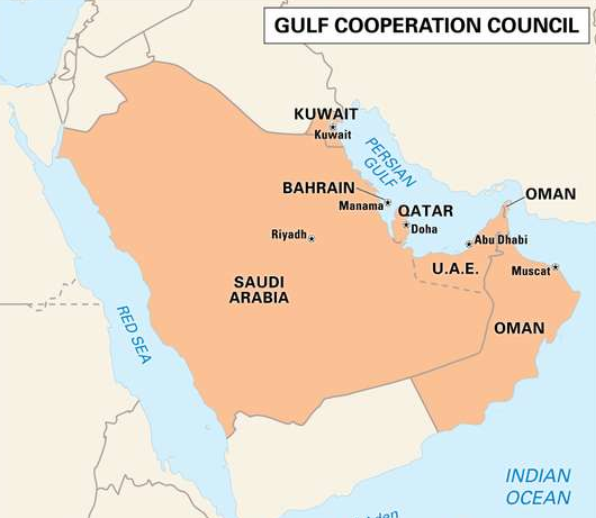International Relations
Gulf Cooperation Council and India
- 04 Nov 2020
- 5 min read
Why in News
Recently, India had a virtual meeting with the Gulf Cooperation Council (GCC), a leading regional organisation comprising almost all Arab countries.
Key Points
- Indian Workers Want to Return to Arab Countries: India has asked the members of the GCC to facilitate the return of Indians who want to resume work with the relaxing of Covid-19-related restrictions. This can happen through sustainable travel bubble arrangements.
- More than eight million Indians live and work in West Asia, with a majority of them within the region covered by the GCC, which includes Bahrain, Kuwait, Oman, Qatar, Saudi Arabia and the UAE.
- ‘Transport Bubbles’ or ‘Air Travel Arrangements’ are temporary arrangements between two countries aimed at restarting commercial passenger services when regular international flights are suspended as a result of the Covid-19 pandemic. They are reciprocal in nature, meaning airlines from both countries enjoy similar benefits.
- Cooperation: Both sides affirmed their commitment to reform multilateral institutions to reflect the realities of the 21st century and work together to address contemporary challenges such as the Covid-19 pandemic, climate change, sustainable development and terrorism.
- The GCC welcomed India's inclusion in the United Nations Security Council (UNSC) as a non-permanent member from January 2021.
- India assured continuing the flow of food, medicines and essential items to the Gulf region. Supply chains from India to the Gulf were not disrupted despite the lockdowns during the pandemic.
Gulf Cooperation Council
- GCC was established by an agreement concluded in 1981 among Bahrain, Kuwait, Oman, Qatar, Saudi Arabia and UAE in view of their special relations, geographic proximity, similar political systems based on Islamic beliefs, joint destiny and common objectives.
- The structure of the GCC consists of the Supreme Council (the highest authority), the Ministerial Council and the Secretariat General. The Secretariat is located in Riyadh, Saudi Arabia.
- It is a political, economic, social, and regional organisation according to its charter.
India’s Relations with the GCC
- Political: The governments of the GCC members are India-friendly and Indian-friendly.
- The Prime MInister of India has received the ‘Order of Zayed’, the highest civilian order of the UAE and the ‘King Hamad Order of the Renaissance’, the third-highest civilian order of Bahrain.
- In the recent past, Saudi Arabia and the UAE have not adopted hostile posture to India’s domestic developments such as removing the special status for Jammu & Kashmir under Article 370.
- Economic: The GCC states are among India’s key suppliers of energy, and annual remittances from Indians in these countries are worth an estimated USD 4.8 billion.
- The United Arab Emirates (UAE) and Saudi Arabia are India’s third and fourth-largest trading partners respectively and the total bilateral trade of the GCC countries with India for the year 2018-19 stood at USD 121.34 billion.
- UAE also features in the top 10 sources of FDI inflows into India.
- Security:
- Both India and the GCC are members of the Financial Action Task Force (FATF).
- Apart from the participation of Saudi Arabia, Oman, Kuwait, and others in India’s mega multilateral Milan Exercise, India also has bilateral exercises with most of them.
- India and Oman hold annual bilateral exercises across all three wings of the armed forces (Army Exercise ‘Al Najah’, Air Force Exercise ‘Eastern Bridge’, Naval Exercise ‘Naseem al Bahr’). Further, Oman has provided the Indian Navy access to the Port of Duqm SEZ which is one of Indian Ocean’s largest deep-sea ports.
- India has a bilateral naval (In-UAE BILAT) as well as an air force exercise (Desert Eagle-II) with the UAE.
Way Forward
- The Gulf region has historical, political, economic, strategic and cultural significance for India. India-GCC Free Trade Agreement (FTA) can provide a boost to the relations.
- Presently, the GCC region is volatile, thus, India needs to safeguard its large economic, political and demographic stakes in the region.





